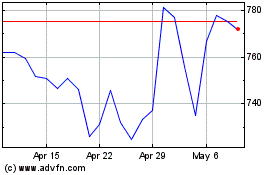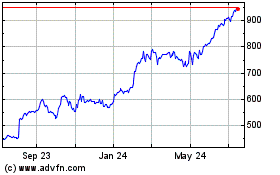Lilly to Halt Development of Experimental Cholesterol Drug -- 2nd Update
October 12 2015 - 12:53PM
Dow Jones News
By Peter Loftus and Tess Stynes
Eli Lilly & Co. said it is ending development of its
experimental cholesterol-modifying drug for cardiovascular disease
because the treatment wasn't effective enough in a clinical
trial--the latest setback for a type of drug that was seen as a
high-risk investment.
Some analysts had predicted the drug, evacetrapib, could become
a blockbuster if it reached the market. The Indianapolis drug
maker's shares fell 8.1% to $79.13 in early trading Monday.
The setback makes it more challenging for Lilly to recover from
a series of patent expirations for older blockbuster drugs that
have hurt the company's sales and profits in recent years. Lilly
has had some success bringing newer drugs to market and continues
to develop other experimental drugs with solid sales potential, but
the absence of evacetrapib dims the company's growth outlook.
It's also the latest setback for a class of drugs known as
inhibitors of cholesteryl ester transfer protein, or CETP. The
pills were designed to raise levels of good cholesterol and to
lower levels of bad cholesterol, with the aim of reducing the risk
of heart attacks and strokes beyond what could be accomplished by a
widely used class of older drugs known as statins.
But so far, the CETP inhibitors haven't panned out in clinical
trials. In 2006, Pfizer Inc. halted a large study of its entry in
the class, torcetrapib, because the drug increased risk of heart
problems. Pfizer later scrapped the project. In 2012, Roche Holding
AG terminated development of its CETP inhibitor because of
insufficient efficacy in studies.
Lilly and Merck & Co. continued to develop their CETP
inhibitors, in hopes their drugs would sidestep the safety and
efficacy problems with Pfizer's and Roche's drugs.
Lilly's study, which began in 2012, had enrolled more than
12,000 patients with high-risk cardiovascular disease, at test
sites in 37 countries. Some were given the Lilly drug daily while
others were given a placebo for up to four years. All patients also
received older treatments for cardiovascular disease. The trial was
due to end in July 2016.
The study tracked whether evacetrapib reduced the risk of
cardiovascular death, heart attack, stroke, coronary surgery or
hospitalization for unstable angina among patients, versus a
placebo.
Lilly said Monday an independent committee monitoring the study
recommended that it be halted based on data indicating a low
probability that the therapy would meet its primary goals in the
study.
Evercore analyst Mark Schoenebaum said in a note on Monday,
"Bottom line: today's news is a negative for [Lilly]."
Without evacetrapib, Evercore estimates a negative impact of
about $5 a share on Lilly's valuation, reducing the firm's estimate
on the stock to about $80 a share from $85, and a negative impact
on its view for 2020 per-share earnings of 50 cents a share,
bringing its 2020 guidance to $6.28 a share.
"We're obviously disappointed in this outcome, as we hoped that
evacetrapib would offer an advance in treatment for people with
high-risk cardiovascular disease," said David Ricks, Lilly senior
vice president and president of Lilly Bio-Medicines. "We remain
confident in our pipeline as we prepare for launches in other
therapeutic areas with significant unmet needs."
The drug maker expects to record a fourth-quarter pretax charge
of as much as $90 million. The company plans to incorporate the
charge into its updated 2015 outlook when it releases its
third-quarter results on Oct. 22.
In February, Lilly said it would extend a phase III trial of
evacetrapib by six months to provide a better view of whether the
treatment in combination with statins is more effective than
statins alone in treating such cases.
A Merck spokeswoman said a 30,000-patient trial of its CETP
inhibitor, anacetrapib, continues, and that results are expected in
2017. "We need to see the data to better understand Lilly's
decision to discontinue its CETP program," she said. "Merck
continues to believe that anacetrapib has the potential to be an
important treatment in the management of atherosclerosis."
Merck shares declined 1.1% to $50.37 in recent trading.
Write to Peter Loftus at peter.loftus@wsj.com and Tess Stynes at
tess.stynes@wsj.com
Subscribe to WSJ: http://online.wsj.com?mod=djnwires
(END) Dow Jones Newswires
October 12, 2015 12:38 ET (16:38 GMT)
Copyright (c) 2015 Dow Jones & Company, Inc.
Eli Lilly (NYSE:LLY)
Historical Stock Chart
From Mar 2024 to Apr 2024

Eli Lilly (NYSE:LLY)
Historical Stock Chart
From Apr 2023 to Apr 2024
